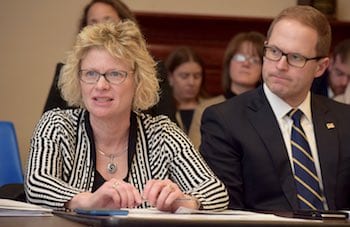
MMA Vice President and Norwell Selectman Ellen Allen (left) expresses the MMA’s support of Gov. Charlie Baker’s housing legislation on Feb. 13. Listening is Arlington Town Manager Adam Chapdelaine.
The MMA Board of Directors on Feb. 13 unanimously endorsed a bill filed by Gov. Charlie Baker in January to promote the creation of 135,000 new housing units by 2025.
The MMA’s support for the administration’s Housing Choice Initiative was announced by MMA President Mark Hawke, the mayor of Gardner, at the February meeting of the Local Government Advisory Commission with the administration. Also thanking the administration for their work on the initiative were Newburyport Mayor Donna Holaday and MMA Vice President Ellen Allen, a selectman in Norwell.
Gov. Charlie Baker and Lt. Gov. Karyn Polito unveiled the initiative, a combination of legislation (H. 4075) and a new grant program, on Dec. 11. The governor testified in support of the legislation during a hearing on Jan. 30 before the Legislature’s Joint Committee on Housing.
An MMA panel consisting of Holaday, Allen and MMA Executive Director Geoff Beckwith also testified, stressing that cities and towns are leading on housing issues and that local officials support the incentives-based approach of the governor’s bill. The panel also voiced support for the additional resources provided by the Housing Choice grant program.
“The governor is 100 percent correct – this is an issue that requires a partnership between the state and our cities and towns,” Beckwith said. “Community leaders need resources, tools, incentives and flexibility, and they also need to preserve their decision-making authority, because there are no one-size-fits-all solutions.
“We applaud the governor’s Housing Choice Initiative, because he is standing with cities and towns, and offering resources and tools that are necessary to make real progress together.”
The centerpiece of the governor’s legislation is changes to Chapter 40A that would reduce the two-thirds voting threshold to a simple majority for cities and towns looking to enact zoning policies laid out in a set of best practices established by the administration.
This change would apply only to municipalities looking to enact specific zoning changes, which include:
• Zoning for multifamily and cluster development
• Establishing by-right zones for accessory apartments (contingent on meeting local health and safety standards)
• Allowing for transfer of development rights
• Reducing parking and dimensional requirements, such as minimum lot sizes
As part of the initiative, the Department of Housing and Community Development is streamlining processes for local governments that engage with the state on housing matters by creating a single online portal for coordinated access to programs, grants and technical assistance across multiple agencies.
The administration plans to provide for more than $10 million in incentives annually, through a combination of new grant funding and technical assistance.
The new grants will be in addition to the $1.2 billion housing bond bill passed by the House on Jan. 25.
Communities that follow the best practices laid out by the administration and obtain the Housing Choice designation will receive priority consideration for the grants. The program will be similar to the Green Communities program, which is voluntary and meant to encourage cities and towns to invest in clean energy and climate change mitigation.
The Legislature’s Housing Committee reported the governor’s bill out in February with minor changes, adding language that would reduce the voting threshold for special permits related to multi-family housing within a half-mile of transit, mixed-use development in commercial center, and reduced parking space-to-residential unit ratios.
The Legislature gave extension orders to two other major zoning and land-use bills, H. 2420 and S. 81, meaning they continue to be active in the legislative process. The MMA has strongly opposed both of these bills throughout the last several sessions, objecting to their by-right zoning requirements for multi-family and cluster development, as well as accessory apartments.
The MMA has long maintained that local control of zoning is a fundamental right and obligation of local citizens in the Commonwealth, and that overriding local voices in the zoning debate will result in less positive outcomes for communities and developers.
Cities and towns have permitted new housing units at a two-decade-high rate over the past two years and are on track to meet the administration’s housing creation goal.
All three bills are now subject to further debate by the Legislature, which is scheduled to adjourn its two-year session on July 31.
